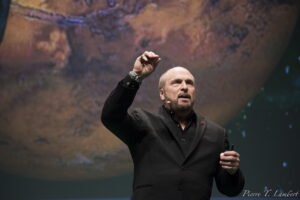

Rick Tumlinson has been called one of the world’s top space “visionaries” and is credited with helping create the commercial space industry of Elon Musk and Jeff Bezos, often referred to as NewSpace. As a result of his world changing work, in 2015 he won the World Technology Award. He is a founding partner of SpaceFund, a new type of investment firm at the intersection of digital financial technologies and space development focused on early stage space companies. A leading writer, speaker, policy expert and Congressional witness, he led the commercial takeover of the Russian Mir space station, signed the first space tourist, co-founded the Space Frontier Foundation, and was a founding board member of the X-Prize. His non-profit organizations, The EarthLight Foundation and the New Worlds Institute support research into frontier enabling research and education.

What is your background, where did you grow up?
I’m an Air Force kid, so I grew up in many places. Primary influences were far West Texas where I lived often with my grandparents, and the UK for about 8 years before I turned 18.
Dad was an Air Force Sargeant, a flight crew chief, its important but still only paid blue collar wages. I am the oldest of three brothers. To support our family, he had to take on sometimes 3 other jobs. He and my grandparents were hardcore about teaching us all practical things. My brothers and I can wire a house, fix a car, shoot a gun and manage a garden. Mum was a lovely little English lady with a wicked sense of humour who set up food pantries and Meals on Wheels in East Texas, and was recognized by the state legislature for her work.
I was a chronic asthmatic early on. I joke about my first camping trip being in an oxygen tent. It made me tough and gave me a ton of time to learn and study. I was essentially self-taught in many areas. By many measurements I was bad kid, a rebel. I was in constant reaction to the system, fighting all the way, eventually joining other bad kids and living a counter life style. I had to re-invent myself several times, always pushing towards an ideal just beyond reach, but getting closer every time. It was a struggle (still is) but slowly I pulled myself towards the dream.
I eventually found myself in New York City married to a lovely actress. I started the New York L-5 Society aboard the Intrepid Aircraft carrier, soon becoming the largest chapter of that organization. Dr. O’Neill’s High Frontier had changed everything for me and so many others. He gave us permission to dream, and shifted the opening of space to something we could do, regular people, in a way making us all feel we had the “right stuff”. So I volunteered to work for Dr. O’Neill at his Institute in Princeton. Through the kindness he and Dr. Dyson and others showed me, I was soon an employee.
Along the way I became involved in the politics and policies of the frontier in DC. We passed the first Space Settlement Act in 1988. At he same time I founded the Space Frontier Foundation with some amazing friends, and during the 1990’s we went to war with the existing aerospace establishment in the name of opening the frontier. Way too much to tell you about that…lol… but we put in place the framework for what we call the NewSpace revolution. Heck, we invented the term at one of our leader’s dining room tables in Virginia. It’s not well known, but without the work of our merry band of volunteers SpaceX an much of the commercial spaceflight industry might not exist today, as we initiated the shift to commercial space in the government and incubated a lot of would be entrepreneurs and their ideas. It was a rough and long fight, again, a long story…
By the way, someone should tell that story sometime, as there were so many who gave their evenings, weekends, family time, vacations and more to open the path for those I call the “billionaire cavalry” to ride through. Real heroes. Personally, I owe a huge debt to those along the way who helped me/allowed me to join in this cause, and to them, the true heroes of the movement.

When did you first become interested in space?
As a kid I couldn’t find a lot of super achiever role models in my immediate surroundings. I retreated into reading, and later films and TV. I lived in the heroes of Robert Heinlein, Isaac Asimov and Arthur C. Clark, (all of whom I got to meet, and even became friends with “Uncle Arthur”, as we used to call him!) I watched the first space race on TV at the same time I was ingesting these visions of the future, including Star Trek and eventually Star Wars and the rest. I could see what was happening out there right now, and was reading and watching stories about where it would lead. In the mind of a young kid it all melded together. I wanted to help “make it so”. But I had no idea how to get there from my life. I wasn’t one of those who knew my path from a young age. Life was too immediate, and it all looked like fiction. It took time and a lot of wrong turns to make it happen. But as Gene Rodennberry told me in a chance encounter in college: it doesn’t matter where you came from or where you are, but where you want to go. Never let anyone tell you that you can’t, always stay your course, and never ever give up.

What do you think the biggest issue facing the industry today?
You ask about the industry, not the cause, not the new space industry, but industry overall…
-
While we fought it for decades, projects like the SLS (what I branded the Senate Launch System) show the government centered element of human spaceflight is still encrusted in a cultural legacy of waste and short term thinking that depends on the USG as its bell weather for permission to think big – except in a few specific cases of very rich dream builders.
-
Lack of smart money. Investors chase shiny objects based not on their true possibility of making long term returns but on the hype or bias of the existing industry – take rockets for example…everyone loves rockets. But we have too many, and it will be sad when so many good intentioned investors lose their money by betting on the hundred or so companies that are doomed to fail in the coming years. Also, we need to develop a way to finance early stage start ups to feed into the new space ecosystem, one reason I started SpaceFund. It can’t all be done by Jeff and Elon. We need far more players, botht to enable and to be enabled by their work.
-
Competition from the aerospace industrial complex/government programs. It’s sad that what passes for visionary when it comes to things like returning to the Moon are often fronts for keeping the pork flowing, again, one can look at Artemis as a ready made way to rationalize SLS which might have died without it. Meanwhile, the private sector pro-frontier companies out there could do the whole thing if given the same funding and support, and at the end we’d have established a vibrant set of communites in space and on the Moon – and be heading to Mars.
-
Lack of imagination. Ironic eh? For example – If this were a common sense field focused on creating a real frontier in space, all current disposable rocket programs would be cancelled to focus on 100% reuse-ability. Nothing else makes sense.
-
Lack of understanding and taking on the Real relevance of our field to the rest of humanity. Buying into the concept that space is over here, away from the mainstream of the rest of human concerns – when instead, it is actually central and should be the central focus of long term human industrial focus.
-
Given all Ive said about the government, there are some very bright and shining lights of hope there. The Air Force/Space Force initiatives have created a major wave of new thinking in the military, frankly born out of many years of work by pro-frontier thinkers rising in their ranks.
-
In Congress and other governments we have planted the seeds of the sorts of laws and policies we need to the people to succeed in their work to open the solar system. There have been some very vision based laws and regulations passed recently. And even in NASA and some of the major aerospace companies one can see the struggle as those who “get it” when it comes to human settlement and development of space battle to put common sense ahead of tired traditions and old school thinking. These people are themselves quiet heroes in my mind.

What do you like to do for fun?
Write, garden, work on my off the grid retro aluminum trailer, long drives in my BMW, motorcycles (between owning one right now) binge on science fiction, live music (after all I live in Austin).

What is your favorite movie and why?
2001 A Space Odyssey. It is the obvious choice for a spacer. It was the first film to try and get it right. At the time it came out we were just getting to the Moon. It showed a plausible future that extended from what was right in front of us. Spaceliners, hotels in space, Lunar research bases, deep space expeditions and more – with real humans at the center. Whatever the plot or prime story, I was enthralled by all the scenes in space, as they seemed so real. I just wanted to be there.

What are some of your favorite books?
As to fiction, of course anything by the three greats Asimov, Clark and Heinlein. Specifically the most important were Stranger in a Strange Land and the Foundation series. The whole Lord of the Rings series/The High Frontier/The War of Art/Durant’s History of Philosophy/2001 A Space Odyssey/Anything by Alan Watts (he’s my guru)

What are you reading now?
-
Do the Work by Steven Pressfield
-
Thomas Paine’s Rights of Man – A Biography
-
Of Plymouth Plantation – William Bradford

Where do you see the space industry in ten years?
We are either going to be on the other side of the revolution and it will be amazing and accelerating or we will stall and fall back into incrementalism.
For example, if Bezos and Musk continue and succeed in radically reducing space transportation costs to and from LEO I see amazing things happening. If NASA and those working on the government side can shift to an enabling approach rather than trying to overly control things like their own return to the Moon we will see the first permanent human communities on the Moon. At least one of these facilities will be leased/owned by a private group such as the Asgardians or a group of believer investors of some sort.
Thankfully, when it comes to humans, this is now seen as a boring” been there done that” area for the government. If they can hand off ISS the right way and we get the railroad to LEO we need, there will be a real estate boom in orbit. There will be at least four space stations of different kinds and more. (Including the Chinese.)
-
Gateway will be gone.
-
Artemis as it is currently conceived will be cancelled or dramatically shifted and supplanted by an Earth focused drive for NASA – meanwhile the private sector will push on, with some supporting tech and funding from the agencies.
-
We will have had our first military confrontation in space. Hopefully resulting in a new set of treaties and understandings for all concerned.
-
We will be moving beyond the swarms of tiny satellite constellations.
-
The first human flights to Mars will have been accomplished by SpaceX.
-
Bezos will be mining the Moon, and perhaps even heading out to grab an asteroid.
-
At least one massive Major climate change related project will be underway in space (one of my next projects).
-
If the billionaires screw it up and fail, if they withdraw or are stifled by people who equate their work with bringing down the .1 percent, things will look like today, with some incremental changes and our dreams pushed further into the future

What would you tell people just starting out in the space industry?
Surround yourself with excellent dreamers. Either build something new yourself or join an entrepreneurial or belief based group in which you can play a bigger role in transforming the future. If you have no other path, go corporate so you can at least participate, but realize your dreams will be in the hands of others. (You can always spin out and do your own thing later.)
Know that if you join or create a start up you are gambling both on yourself and your team-mates – so they better be dam good – as there is some equation out there that says your own excellence is directly proportional to the team you lead or are a part of and this means more than brilliance. It includes things like integrity, compassion, grit and a willingness to dive in and pick up a mop if needed. No flakes, assholes or elitists allowed – even if they are a genius, as they will sink you/screw you/kill your team or spirit in the end. That’s what airlocks are for.
Before you start something new study the field, know that the biggest liar you will meet is yourself and your own ability to snowjob your own practical sensibilities, so make sure you have a good reality check network around you, and don’t be so attached to your idea that you cant let it go if something else makes better sense.
Always remember – There is a very, very fine line between someone who clings to something stupid and tanks and someone who won’t take no for an answer and becomes a star.
We have enough rocket engineers. Do something else.
Don’t start anything that will take a hundred million to succeed. Pick something that can make money either directly related to your space goals very soon, or that can produce something also relevant to a current market.
However no matter what you choose, realize this is a long play, and do not forsake family and your own well being today in hopes of it all happening quickly. In the end we do this for life, love and humanity. Don’t lose yours in the quest to be great, rich or powerful, for when you succeed and your descendants are sitting by the viewing port of their city in space, you want the songs they sing of you to be those of someone who was good.

